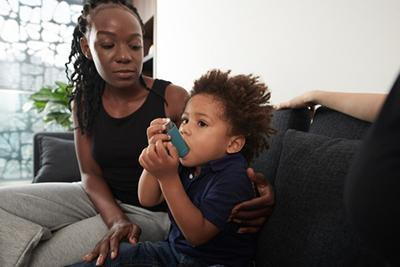Asthma in Children: Causes, Management, and Prevention

- posted: Nov. 05, 2023
Asthma in Children: Causes, Management, and Prevention
An asthma attack can be a scary situation, especially if you are the parent of a child with asthma. Prevention and management of asthma symptoms are critical to help your child live an active, healthy life. Your pediatrician can help. Dr. Maged Farid and Dr. Ramagavri Rawal at Florida Pediatrics Group provide a wide range of pediatric services, including diagnosis and treatment of asthma. They have two convenient office locations in Melbourne, and West Melbourne, FL, to help you and your child.
What You Need To Know About Childhood Asthma
If your child has asthma, he or she is not alone. In fact, the CDC estimates 1 in 10 children suffer from asthma. Your child is at increased risk of having asthma if your child has:
- A family history of asthma
- Allergies, which can trigger an asthma attack
- Exposure to smoke, pollution, and other irritants
Asthma can be brought on by exposure to an allergen, a substance your child is allergic to. Asthma symptoms can also be brought on by frequent colds or respiratory infections.
There are several ways you can help prevent your child from having an asthma attack. Modifying your child’s living environment is one of the most important ways to prevent an asthma attack. You should:
- Vacuum frequently, or consider hard flooring
- Wash pillowcases and sheets regularly
- Use hypoallergenic sheets and pillowcases
- Keep pets off furniture and out of your child’s bedroom
- Install a HEPA filter in your child’s bedroom
It’s also important for your child to:
- Avoid substances your child is allergic to
- Keep your child away from smoke
- Have regular physical activity to help your child’s lungs
- Visit the pediatrician regularly to monitor your child’s asthma
One of the first steps in treating asthma is to find out if your child has allergies, and what your child is allergic to. Your pediatrician may recommend allergy testing to discover if your child is allergic to pollens, pets, dust, mold, or other substances. Allergy treatment consists of allergy injections, sublingual immunotherapy, and other treatment options.
Your pediatrician may also check your child’s lung function using spirometry and other tests to determine the severity of your child’s asthma. Your pediatrician will develop an action plan to manage your child’s asthma, which may include:
- Long-term asthma control medications including inhaled corticosteroids, leukotriene modifiers, combination inhalers, and theophylline
- Quick-relief rescue medications including oral corticosteroids, short-acting beta agonists, and ipratropium
Want To Know More?
To find out more about the causes, management, and prevention of asthma, talk with the experts. Call Dr. Maged Farid and Dr. Ramagavri Rawal at Florida Pediatrics Group. You can reach them in either of their office locations in Melbourne, and West Melbourne, FL, by calling (321) 752-5210, so call today.

- posted: Nov. 05, 2023
Asthma in Children: Causes, Management, and Prevention
An asthma attack can be a scary situation, especially if you are the parent of a child with asthma. Prevention and management of asthma symptoms are critical to help your child live an active, healthy life. Your pediatrician can help. Dr. Maged Farid and Dr. Ramagavri Rawal at Florida Pediatrics Group provide a wide range of pediatric services, including diagnosis and treatment of asthma. They have two convenient office locations in Melbourne, and West Melbourne, FL, to help you and your child.
What You Need To Know About Childhood Asthma
If your child has asthma, he or she is not alone. In fact, the CDC estimates 1 in 10 children suffer from asthma. Your child is at increased risk of having asthma if your child has:
- A family history of asthma
- Allergies, which can trigger an asthma attack
- Exposure to smoke, pollution, and other irritants
Asthma can be brought on by exposure to an allergen, a substance your child is allergic to. Asthma symptoms can also be brought on by frequent colds or respiratory infections.
There are several ways you can help prevent your child from having an asthma attack. Modifying your child’s living environment is one of the most important ways to prevent an asthma attack. You should:
- Vacuum frequently, or consider hard flooring
- Wash pillowcases and sheets regularly
- Use hypoallergenic sheets and pillowcases
- Keep pets off furniture and out of your child’s bedroom
- Install a HEPA filter in your child’s bedroom
It’s also important for your child to:
- Avoid substances your child is allergic to
- Keep your child away from smoke
- Have regular physical activity to help your child’s lungs
- Visit the pediatrician regularly to monitor your child’s asthma
One of the first steps in treating asthma is to find out if your child has allergies, and what your child is allergic to. Your pediatrician may recommend allergy testing to discover if your child is allergic to pollens, pets, dust, mold, or other substances. Allergy treatment consists of allergy injections, sublingual immunotherapy, and other treatment options.
Your pediatrician may also check your child’s lung function using spirometry and other tests to determine the severity of your child’s asthma. Your pediatrician will develop an action plan to manage your child’s asthma, which may include:
- Long-term asthma control medications including inhaled corticosteroids, leukotriene modifiers, combination inhalers, and theophylline
- Quick-relief rescue medications including oral corticosteroids, short-acting beta agonists, and ipratropium
Want To Know More?
To find out more about the causes, management, and prevention of asthma, talk with the experts. Call Dr. Maged Farid and Dr. Ramagavri Rawal at Florida Pediatrics Group. You can reach them in either of their office locations in Melbourne, and West Melbourne, FL, by calling (321) 752-5210, so call today.
Office Hours
Melbourne (Silver Palm) Office
Monday
9:00 am - 4:00 pm
Tuesday
9:00 am - 4:00 pm
Wednesday
9:00 am - 4:00 pm
Thursday
9:00 am - 4:00 pm
Friday
9:00 am - 4:00 pm
Saturday
Closed
Sunday
Closed
West Melbourne (Wickham) Office
Monday
8:00 am - 5:00 pm
Tuesday
8:00 am - 5:00 pm
Wednesday
8:00 am - 5:00 pm
Thursday
8:00 am - 5:00 pm
Friday
8:00 am - 4:00 pm
Saturday
9:00 am - 11:00 am
Sunday
Closed
Merritt Island Office
Monday
9:00 am - 4:00 pm
Tuesday
9:00 am - 4:00 pm
Wednesday
9:00 am - 4:00 pm
Thursday
9:00 am - 4:00 pm
Friday
9:00 am - 4:00 pm
Saturday
Closed
Sunday
Closed
